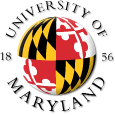Syllabus
Biochemical Engineering
Spring 2016
Instructor:
- Nam Sun Wang
- Class Hours: TuTh 12:30pm-1:45pm, EGR1104
- Office Hours: TuTh 3:30pm-4:30pm, W12:00noon-1:00pm, Rm 1208 Chemical Engineering Bldg.
- Phone: 301-405-1910 (call for appointment outside the office hours)
- Email: nsw@umd.edu
Required Textbooks:
- "Bioprocess Engineering, Basic Concepts," 2nd Edition,
Michael L. Shuler and Fikret Kargi, Prentice Hall, 2001.
ISBN-10: 0130819085
ISBN-13: 978-0130819086
Prerequisites:
Senior standing or permission of both the instructor and the department.
Contents:
The course will be guided by the following description taken from
our university catalog:
Introduction to biochemical and microbiological applications to
commercial and engineering processes, including industrial
fermentation, enzymology, ultrafiltration, food and
pharmaceutical processing and resulting waste treatment. Enzyme
kinetics, cell growth, energetics and mass transfer.
- Biochemical & Bioprocess Engineering (Ch 1)
- Biology & Biochemistry (Ch 2)
- Enzyme Kinetics & Immobilization (Ch 3)
- Genetics & Cellular Control Systems (Ch 4)
- Genetic Engineering (Ch 8, 14)
- Metabolism (Ch 5)
- Stoichiometry (Ch 7)
- Cell Growth Kinetics (Ch 6)
- Bioreactor Design & Operation (Ch 9)
- Scale-up, Heat/Mass Transfer, Instrumentation, Control (Ch 10)
- Product Purification & Recovery (Ch 11)
- Mixed Culture (Ch 16)
Objectives:
The objective of the course, as implied by the course content
above, is to introduce fundamental biochemical engineering
concepts primarily to chemical engineers. The course does not
assume any biological background or any prior courses in biology
or microbiology, although it certainly helps to
have some. To accommodate those who do not have the biological
background, the course will first survey the basic ideas from
microbiology, biochemistry, and the central dogma of biology.
Subsequently, the emphasis will be application of the following
core chemical engineering concepts to biological problems.
- Material and heat balances
Distributed throughout
- Reaction kinetics and reactor design
enzyme kinetics, fermentation kinetics,
batch/fed-batch/continuous
bioreactor, recycle, bioreactors-in-series, heterogeneous
catalysis, biological wastewater treatment
- Transport
Immobilized enzyme/cell reactor, biofilm reactor, mixing,
oxygen mass transfer,
sterilization, separation and product purification
- Thermodynamics
Energy efficiency, yield
- System dynamics
Steady-states, Metabolic network, bioreactor stability, mixed culture
- Applied mathematics
Distributed throughout
These concepts will be conveyed primarily through conventional
lectures supplemented by in-class demonstrations Computer
simulations will help students gain a feel for the effect of
various model and operating parameters.
We will touch upon the issues of ethics surrounding gene
cloning, the balance between biotechnology's benefit to the
society and profiteering, and the regulatory issues.
A student who wishes to pursue a career as a patent examiner,
chemical process engineer, or bioprocess engineer, or one who intends to
continue graduate studies (in chemical engineering, medicine,
law, or business) will benefit from the course. Upon successful
completion of this course and the subsequent biochemical
engineering laboratory sequence, the student should be employable
by the biopharmaceutical industry as a bioprocess engineer.
Grading:
The outcomes will be measured by homework assignments,
2 mid-term examinations, and a final examination. The semester
grade will be based on the following assessments.
| Assessment | Weight
|
|---|
|
| Homework (weekly) | 30%
|
| Midterm Exams (3/03/16, 4/14/16) | 30%
|
| Final Exam (5/17/16, 1:30pm-3:30pm) | 40%
|
Students are guaranteed the following letter grades. That means
the instructor will not raise the cut-off points. However, the
instructor shall reserve the right to lower the cut-off points at
the end of the semester; this allows for different degrees of
difficulties in the assessment and variations among graders.
Students manage their time accordingly.
| Fraction of Points Earned | Letter Grade
|
|---|
| 0.80- | A (A+, A-)
|
| 0.67-0.80 | B (B+, B-)
|
| 0.55-0.67 | C (C+, C-)
|
| 0.40-0.55 | D
|
| 0.00-0.40 | F
|
For example, if you earn a total of 250 regular points out of a
possible 300 points plus another 30 extra-credit points on the
homework assignments, a total of 150 points out of a possible 200
points based on two midterm exams, and a total of 100 points out of a
possible 200 points on the final examination, your fractional
score at the end of the semester is:
(250+30)/300*0.30 + 150/200*0.30 + 100/200*0.40 = 0.735
Homework Midterm Exams Final Exam fractional score
The above lookup table shows that a fractional score 0.735 translates to a
semester letter grade of "B". Thus, you can easily track your
own letter grade during the semester.
Homework is due at the beginning of the class on the specified
due date; no late homework will be accepted unless individually
arranged with the instructor before the due date with a
valid excuse. Discussion among classmates is allowed in
solving homework assignments, but each student must do his/her
own work (no copying!).
Plagiarism and academic
dishonesty absolutely will NOT be tolerated, and suspected
incidence will be referred to the Student Honor Council of the
Judiciary Programs. It is your responsibility to consult
the instructor whenever there is any doubt on the definitions of
these terms or on the allowable materials on each specific
homework assignments or quizzes/exams. See Policy on Academic Integrity.
Whether or not you sign explicitly in each assignment or exam, it
is assumed that you adhere to the following University of
Maryland's Honor Pledge.
"I pledge on my honor that I have not given or received any
unauthorized assistance on this assignment/examination."
If you have a documented disability and wish to discuss academic
accommodations with the instructor, please do so as soon as
possible.
Return to Prof. Nam Sun Wang's Home Page
Return to Biochemical Engineering (CHBE482)
Biochemical Engineering -- Syllabus
Forward comments to:
- Nam Sun Wang
- Department of Chemical & Biomolecular Engineering
- University of Maryland
- College Park, MD 20742-2111
- 301-405-1910 (voice)
- 301-314-9126 (FAX)
 e-mail: nsw@umd.edu
©2016 by Nam Sun Wang
e-mail: nsw@umd.edu
©2016 by Nam Sun Wang

| |
 e-mail: nsw@umd.edu
©2016 by Nam Sun Wang
e-mail: nsw@umd.edu
©2016 by Nam Sun Wang
